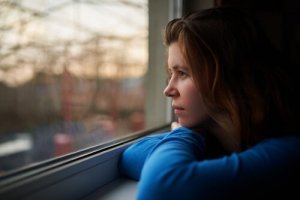The Importance of Sunlight during Home Confinement


Written and verified by the psychologist Valeria Sabater
Lack of sunlight during confinement is a reality that has been affecting multiple households. The current pandemic has arrived in a spring that’s slowly disappearing. The days are longer and brighter, the sun is warmer, but still millions of people around the world face quarantine without direct contact with something that’s essential for human beings. In this article, discover the importance of sunlight for your life.
Living in small apartments where the sun doesn’t enter is a common problem for many people. There are also ground floor flats located in narrow streets of our cities, where it’s difficult to know whether it’s morning or afternoon. These factors can have a certain impact on health but, above all, on our psychological well-being.
We are homeothermic. In other words, we depend on sunlight to regulate our temperature. We also depend on it to balance our sleep cycles and for our bodies to perform several different metabolic tasks. Feeling its warmth also has an indispensable and powerful effect on our mental health.

The importance of sunlight for your well-being during confinement
Michael Terman is a well-known psychiatrist and expert in chronotherapy (a treatment to help regulate our sleep phases). One thing he’s been able to see throughout his career is how changes in the light of different seasons or variations in light in different buildings affect human behavior. In the absence of sunlight, people suffer from sleep and mood disturbances and also changes in weight.
Many of us aren’t aware of the relevance of this factor in our lives. We live in a society that’s accustomed to carrying out much of its activity indoors, under artificial light.
Most of us work indoors. We get up at dawn and return home at dusk. Once at home, we’re still in contact with our electronic devices, with computers, mobile phones, televisions, etc. The so-called blue light that these devices emit also alters our circadian rhythms, reducing the production of melatonin.
Now, in the current context of the pandemic and with confinement as a preventive measure to contain contagion, a new problem is emerging. Lack of sunlight during confinement in many homes can take its toll. Let’s consider the importance of sunlight and what measures we should apply.
Vitamin D deficiency
According to a study conducted by the University of California by Dr. Robert Nair, almost 50% of the world’s population is probably deficient in vitamin D. One of the main causes is the lack of outdoor activity and not having enough contact with sunlight.
Thus, a lack of sunlight during confinement can aggravate this fact. This can lead to problems in regulating calcium metabolism and can weaken your immune system.
Therefore, you should try to get at least 20 minutes of exposure to sunlight a day. If you’re still not allowed out, then take advantage of a terrace, a window, or some part of the house where natural light enters.
On the other hand, don’t forget that there are other sources of vitamin D, such as dairy products, eggs, or oily fish.

Sleep problems associated with a lack of sunlight during confinement
Being in a house or apartment with a lack of light can affect your sleep
These changes can cause insomnia, hypersomnia, or a change in sleep habits. You start to take long naps, and then, when it’s bedtime, you’re not tired. As far as possible, it would be appropriate to follow these guidelines.
- Establish routines in order to manage your time better. If you always keep to the same habits and routines and are disciplined, you’ll notice the difference in your life. When you do this, you’ll carry out the most intense activities, such as teleworking, tidying up the house, or even exercising in the morning hours. In the afternoon, you’ll do more relaxing activities, such as practicing a hobby, reading, or watching TV shows.
- It’s also essential to get up and go to bed at the same time. If you take a nap, then make them short ones, of approximately 20 to 25 minutes.
- Another goal is to make sure that your brain can easily distinguish day from night. Looking for a natural light source and taking advantage of it for 20 minutes can greatly benefit you.
Mental health and mood in low light
There’s one aspect that you really can’t neglect. Your mental health can also be affected if you’re confined to a small area with little sunlight during lockdown.
You’ll need to activate your psychological defenses, have resources at hand, and, above all, have support from others. Living somewhere with little or no natural light will only increase your discouragement. By way of a summary and a conclusion, here are some tips that you should take into account:
- We’ll say it again: it’s essential for you to spend at least 20 minutes exposed to natural sunlight each day.
- Avoid having your house in semi-darkness. Use low-cost lights that create a pleasant atmosphere.
Again, we stress the need for set routines to organize your time. - Keep in touch with people through messages, calls, video calls, etc.
- Do creative tasks to exercise your mind, free yourself, and find time to connect with the here and now.
- Physical exercise will also help you produce endorphins, serotonin, and dopamine, neurotransmitters that are indispensable for improving our mood.
- Look to the horizon and set some goals. Accept your negative emotions, which come from time to time. Don’t forget your goals and ensure that your hopes and dreams never fade.
In conclusion, confinement isn’t easy for anyone. However, some people find themselves in more vulnerable situations than others. Bear this in mind and follow strategies to improve your quality of life in these circumstances. And remember: don’t hesitate to ask for help if you need it.
All cited sources were thoroughly reviewed by our team to ensure their quality, reliability, currency, and validity. The bibliography of this article was considered reliable and of academic or scientific accuracy.
- Nair, R., & Maseeh, A. (2012, April). Vitamin D: The sunshine vitamin. Journal of Pharmacology and Pharmacotherapeutics. https://doi.org/10.4103/0976-500X.95506
This text is provided for informational purposes only and does not replace consultation with a professional. If in doubt, consult your specialist.








